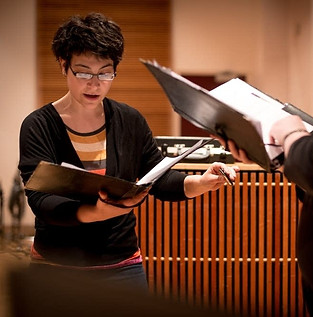Abbie Betinis has been honored to attend performances of her music from Carnegie Hall to Disney Hall, school assemblies to wedding ceremonies, state prisons to capitol buildings, summer camps to the finest international cathedrals. In 2018, her music was performed on four continents, totaling over 500 performances.
Working largely by commission, Abbie has composed new music for world-class organizations, including the American Choral Directors Association, American Suzuki Foundation, Cantus, and many, many more.
Inspired by history and culture, patterns and play, some of her projects incorporate unique elements from early American shape-note singing, Eleanor Roosevelt’s bedtime routine, Gaelic keening, Japanese origami, and the mysticism of medieval Sufism. In January 2017, spurred to action by the US political climate, she and Tesfa Wondemagegnehu co-founded Justice Choir, a template for community singing and mobile advocacy.
Originally from Wisconsin, Abbie is a graduate of St. Olaf College (B.A.), the University of Minnesota (M.A.), and holds a diplôme from the European American Musical Alliance Institute in Paris, France. She lives in Minnesota, where she is Adjunct Professor of Composition at Concordia University-St Paul and executive director of Justice Choir.
To learn more, visit abbiebetinis.com
Repertoire
A Blessing of Cranes
Premiered at the 2015-2016 concert, Sonic Awakening
SSAA Work
Lyrics
How do we love you more than to shape you?
Turning so firmly in the shadows of fingers.
How do we love you more than to let you go?
Waves of earth's oceans, waves of our willing hands
Creasing and folding, creasing and folding, unfolding.
How do we love you more than to shape you?
Never a thought of thinking, only this weaving,
These thousands of wings we make to carry our longing;
How do we love you more than to let you go?
No trembling before the task, simply this sweetness,
Freedom from fear, receiving this heartbeat, receiving.
How do we love you more than to shape you?
Blossoms that shimmer and gather about their branches,
Returning to earth her peace, her original blessing;
How do we love you more than to let you go?
Deeper than dream to say, even than singing,
Releasing the wishes we have, the asking for healing;
How do we ever love you more than to shape you?
How do we love you more than to let you go?
About
After being inspired by the Japanese art of origami, Abbie Betinis collaborated with poet Michael Dennis Brown to write A Blessing of Cranes. This piece was commissioned by the 2014 ACDA Women's Choir Commission Consortium.
Words from Abbie Betinis:
"On August 6, 1945, the force from the atomic bomb that devastated Hiroshima, Japan, blew two-year-old Sadako Sasaki out the window. She survived, but by age 12, began to show signs of leukemia, caused by radiation from the blast. Her friend Chizuko visited her in the hospital and brought a gold piece of paper which she had folded into a paper crane using the art of origami. A Japanese legend promises a wish will be granted to the person who folds a thousand cranes, so Sadako set to work, saying 'I will write peace on your wings, and you will fly all over the world.' She folded over 1,300 cranes in the hope of healing her cancer, and healing the world from war. Sadako died later that year, but her statue stands today, holding an origami crane - now a worldwide symbol of peace - at the Children's Peace Monument in Hiroshima, and it receives colorful "Senbazuru" (a thousand cranes tied together) from people around the world.
When I realized there would be about 1,000 singers as part of this special commission, I wondered, could I ask each singer to fold a paper crane? Perhaps together we could advance our wish for peace. What if each choir could 'fold' a crane musically, just by singing? I started experimenting with the paper, creasing and folding - trying to figure out how to render this beautiful, meditative, and geometric activity into sound. By mapping each fold to a note on the staff, I was able to slowly transform the folding process from physical to musical. With my cranes and sketches in tow, I approached poet and librettist Michael Dennis Browne, to ask if this idea inspired him too, and I'm so grateful that it did. He wrote a beautiful poem - geometric, hopeful, intimate and worldly - and I've attempted to craft the music with as much elegance.




